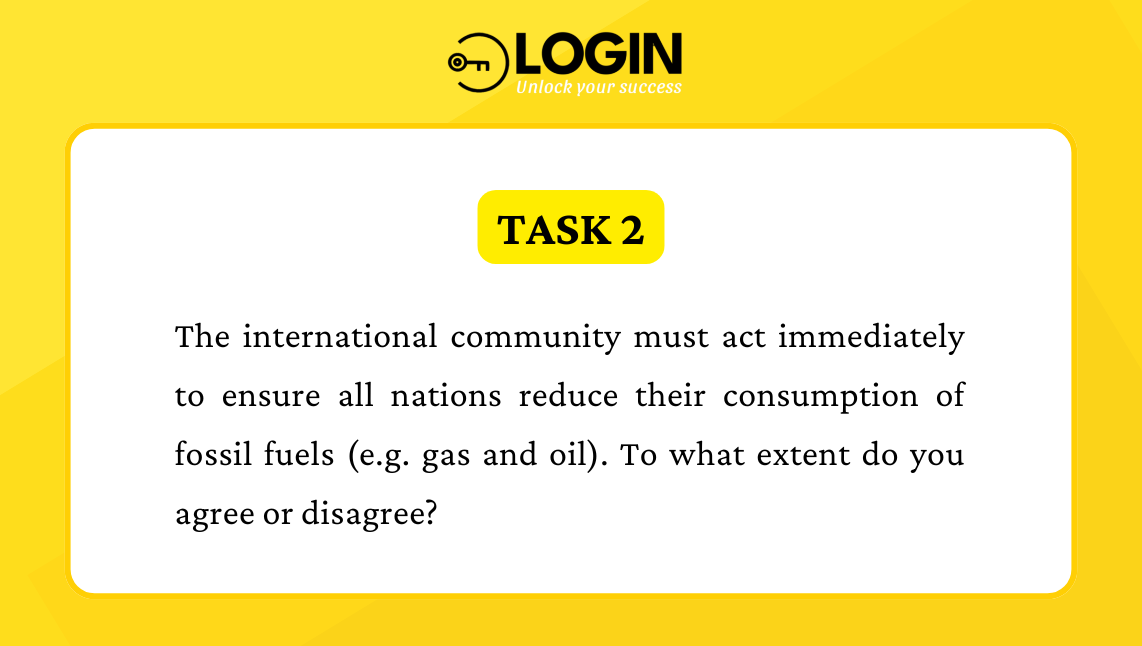
Bài mẫu IELTS Writing Task 2 - Giải đề thi thật
Trong bài viết hôm nay, IELTS Login sẽ đồng hành cùng bạn chinh phục dạng bài “To what extent do you agree or disagree?” qua một đề thi thật. Bài viết cũng sẽ cung cấp những từ vựng và cấu trúc “ăn điểm” giúp bạn viết bài mạch lạc, thuyết phục và đạt điểm cao. Cùng bắt đầu nhé!

SAMPLE OUTLINE
|
INTRODUCTION
|
Paraphrase lại đề bài (Thế giới đang phải đối mặt với một thách thức nghiêm trọng do mức tiêu thụ nhiên liệu hóa thạch ngày càng tăng, chẳng hạn như khí đốt và dầu mỏ Nhiều người tin rằng cộng đồng toàn cầu cần phải hành động nhanh chóng để giảm mức tiêu thụ nhiên liệu hóa thạch.) → The world is facing a critical challenge due to the increasing consumption of fossil fuels, such as gas and oil. Many people believe it is imperative for the global community to take prompt action to decrease their consumption of fossil fuels.
|
|
Đưa ra quan điểm của bản thân (Ở đây giả sử người viết ĐỒNG TÌNH với ý kiến trên đề bài) → I completely agree with this suggestion.
|
|
|
BODY 1
|
Main point 1 (Giảm tiêu thụ nhiên liệu hóa thạch sẽ giảm thiểu tác động tiêu cực của biến đổi khí hậu.) → Reducing the consumption of fossil fuels will mitigate the adverse effects of climate change.
|
|
Explanation 1 (Việc đốt than, dầu, và xăng sản sinh ra một lượng lớn khí nhà kính, thường chúng sẽ giữ lại nhiệt trên bầu khí quyển và đẩy nhanh quá trình nóng lên toàn cầu) → Burning coal, oil, and gas produces large amounts of greenhouse gases, which trap heat in the atmosphere and accelerate global warming.
|
|
|
Explanation 2 (Việc chuyển đổi sang năng lượng sạch làm chậm quá trình nóng lên toàn cầu + đảm bảo nguồn cung cấp điện ổn định cho các thế hệ tương lai.) → Transitioning to clean energy, such as solar, wind, and hydropower, can both slow down global warming and provide a sustainable power supply for future generations. |
|
|
Example (Một số thành phố đã khuyến khích đi xe đạp và sử dụng phương tiện giao thông công cộng để cắt giảm khí thải, trong khi những thành phố khác sử dụng nhiệt thải từ các nhà máy điện để cung cấp năng lượng cho các tòa nhà.) → Some cities have promoted cycling and public transport to cut emissions, while others use waste heat from power plants to supply buildings.
|
|
|
Result (Những sáng kiến này → giúp giảm lượng khí thải carbon + chứng minh rằng tính bền vững lâu dài là có thể đạt được.) → These initiatives help reduce carbon footprints and prove that long-term sustainability is achievable.
|
|
|
BODY 2
|
Main point 2 (Giảm tiêu thụ nhiên liệu hóa thạch sẽ có tác động đáng kể đến sức khỏe cộng đồng.) → Cutting fossil fuel consumption will have a significant impact on public health.
|
|
Explanation 1 (Việc đốt dầu và than thải ra rất nhiều sương khói và các hạt bụi li ti có hại, điều này gây ra các vấn đề hô hấp và các bệnh về tim mạch.) → The burning of oil and coal releases smog and harmful particles, which cause respiratory problems and cardiovascular diseases.
|
|
|
Explanation 2 (Giảm sự phụ thuộc vào nhiên liệu hóa thạch → cộng đồng quốc tế có thể đảm bảo không khí trong lành hơn và môi trường sống lành mạnh hơn.) → By reducing dependence on fossil fuels, the international community can ensure cleaner air and healthier living environments.
|
|
|
Example (Trung Quốc đã hạn chế sự phụ thuộc lên than và đã giới thiệu nhiều biện pháp quản lý chất lượng không khí cứng rắn.) → China, for instance, has reduced its reliance on coal and introduced strict air quality measures.
|
|
|
Result (Mức độ khói bụi ở các thành phố lớn đã giảm → dẫn đến ít bệnh về đường hô hấp hơn và giảm số ca tử vong sớm.) → As a result, smog levels in major cities have dropped, leading to fewer respiratory illnesses and a decline in premature deaths |
|
|
CONCLUSION
|
Tóm tắt lại quan điểm của bản thân → In conclusion, I wholeheartedly agree that the international community must act immediately to ensure all nations reduce their consumption of fossil fuels.
|
SAMPLE ANSWER AND VOCABULARY HIGHLIGHT
(289 words)
The world is facing a critical challenge due to the increasing consumption of fossil fuels, such as gas and oil. Therefore, many people believe it is imperative for the global community to take prompt action in order to ensure that all countries decrease their consumption of fossil fuels, and I completely agree with this suggestion.
Firstly, reducing the consumption of fossil fuels will help to mitigate the adverse effects of climate change. Burning coal, oil, and gas produces large amounts of greenhouse gases, which trap heat in the atmosphere and accelerate global warming. Transitioning to clean energy, such as solar, wind, and hydropower, can both slow down global warming and provide a sustainable power supply for future generations. For example, some cities have promoted cycling and public transport to cut emissions, while others use waste heat from power plants to supply buildings. These initiatives not only reduce carbon footprints but also prove that long-term sustainability is achievable.
Secondly, cutting fossil fuel consumption will have a significant impact on public health. The burning of oil and coal releases smog and harmful particles, which cause respiratory problems and cardiovascular diseases. By reducing dependence on fossil fuels, the international community can ensure cleaner air and healthier living environments. China, for instance, has reduced its reliance on coal and introduced strict air quality measures. As a result, smog levels in major cities have dropped, leading to fewer respiratory illnesses and a decline in premature deaths. This demonstrates that lowering fossil fuel use not only protects the planet but also safeguards people’s well-being.
In conclusion, I wholeheartedly agree that the international community must act immediately to ensure all nations reduce their consumption of fossil fuels. It's a global responsibility to adopt sustainable energy sources and reduce our dependence on finite resources.
mitigate (v): giảm thiểu
adverse effects (n): ảnh hưởng bất lợi
hydropower (n): năng lượng thủy
power supply (n): nguồn cung cấp điện
waste heat (n): rác thải nhiệt
power plants (n): nhà máy điện
smog (n): sương khói (smoke + fog)
harmful particles (n): các hạt bụi li ti có hại
respiratory problems (n): các vấn đề hô hấp
cardiovascular diseases (n): bệnh tim mạch
premature death (n): tử vong sớm
safeguard (v) = protect: bảo vệ
finite (adj): có hạn
Hy vọng Bài mẫu IELTS Writing Task 2 đã cung cấp thêm cho các bạn nhiều ý tưởng và từ vựng hay để vận dụng vào bài viết của mình khi Luyện thi IELTS Writing Task 2. Chúc các bạn đạt kết quả cao trong kì thi chinh phục band điểm IELTS cao !
Xem thêm:
Bài mẫu IELTS Writing Task 2 - Giải đề thi thật (Dạng: Causes and Solutions - Get into debt)
Bài mẫu IELTS Writing Task 2 - Giải đề thi thật (Dạng: Two-part Question - A perfect society)
Bài mẫu IELTS Writing Task 1 - Giải đề thi thật (Dạng: Process)
Bài mẫu IELTS Writing Task 1 - Giải đề thi thật (Dạng: Map)
Bài mẫu IELTS Writing Task 1 - Giải đề thi thật (Dạng: Table)
Bài mẫu IELTS Writing Task 2 - Giải đề thi thật (Dạng: Discuss both views - Protect wild animals)
_________________
Biên soạn bởi IELTS Login Academic Team

